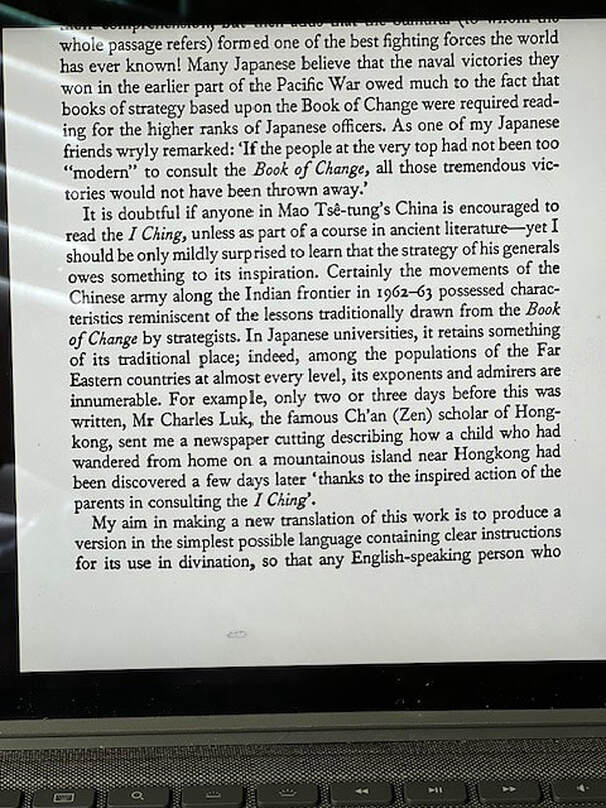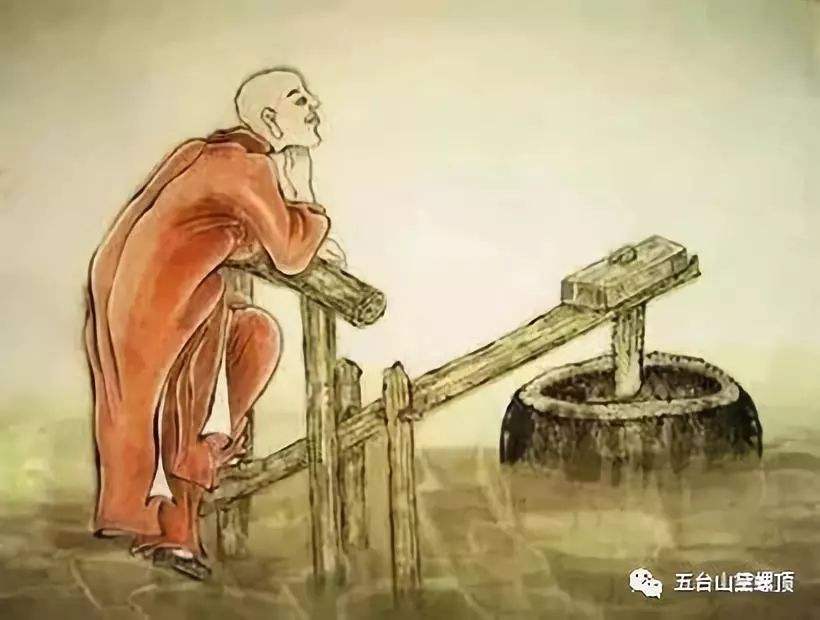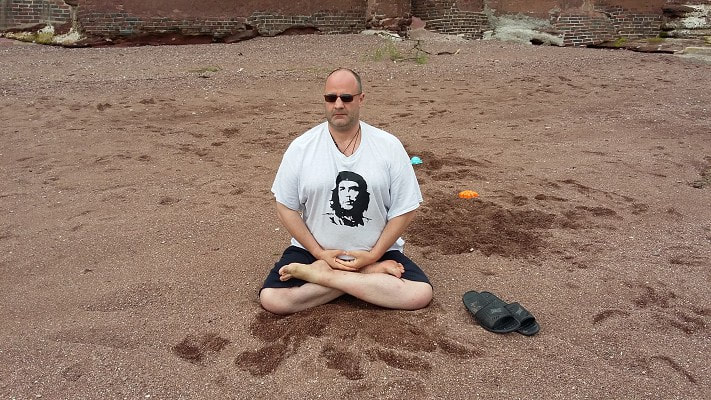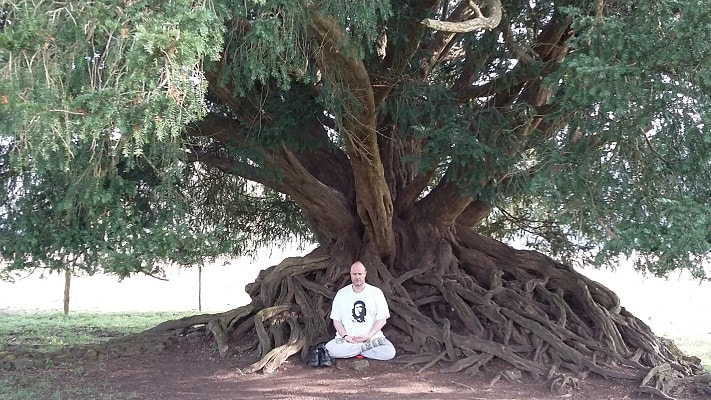|
Dear B Douglas Harding used to hold Zen meditation sessions by lying on the floor. He had no time for formal structure - as 'having no head' also apparently meant that 'he had no body' - although most people who encounter his work seem not to realise the latter. Richard Hunn knew John Blofeld and Douglas Harding - although if he knew Terrence Grey - nothing was said to me. Blofeld mentions meeting Xu Yun - but Xu Yun does not mention meeting Blofeld. This need not negate the encounter - as Xu Yun was photographed with numerous Westerners - many of whom are not mentioned in his biography. In the UK - the barbarous treatment meted-out by the Imperial Japanese Army to British POWs and civilians is still remembered with disgust and derision - as is their savage treatment toward tens of millions of Asian victims. Just what Blofeld is talking about does not ring true. Richard told me that Blofeld eventually retired to Thailand - and 'gave-up' Buddhism in the last years of his life - becoming anti-Asian and pro-Christian, so perhaps his wayward attitudes express these changes. I inherited Charles Luk's papers, and having looked through the volumes, I can say that there is no mention of John Blofeld, Douglas Harding or Terrence Grey. Charles Luk was opposed to Japanese religious corruption and actively campaigned against it. He certainly would not have assisted Blofeld if he knew of his pro-Japanese attitudes. As to hilly Hong Kong mountains - he is probably speaking of the Sai Kung area of the New Territories - where our Ancestrial village used to be. As the area is now a 'National Park' - the US social media has extended the so-called '411' mythology to include this area. Whenever I visited the area - I used to make sure I was with Chinese relatives who knew where they were going. Yes - Richard Hunn gave me his copy of John Blofeld's Yijing. It is a peperback to which Richard added a stouter cover. Of course, it is not the full Yijing, but only the Hexagrams, its line commentaries, the Judgements and Images. From what I can see, I believe Blofeld is copying Wilhelm and is not working from the original Chinese language text. It is a re-interpretation of a translation. Of course, I suspect there are hundreds of these re-interprtations in the English language by now - and that a certain selection can grant an overview of the original text. I am told that an astonishing 600,000 Americans go missing each year in well sign-posted National Parks and National Forests - although all but 6,000 are found safe and well - and that this finding is through the application of the scientific method. When people's lives are at stake I doubt superstition can replace logic and reason. In the days that Blofeld is referring to - the New Territories were strewn with hundreds of villages - many of them Hakka (he does not know this because he never went there). The distance between villages was quite often miniscule. I would say that getting truly lost would have been very difficult as there were settlements everywhere. These are the settlements the Imperial Japanese Army raped and pillaged their way through - killing at least 10,000 people in a relatively small area (1941-1945). The Yijing certainly did not assist the ethnic Chinese escape this fate. One last point that Blofeld is missing is that the Imperial Japanese Government 'banned' everything 'Chinese' - and this included the study of the Yijing. Blofeld is, therefore, misinformed and I would say, not to be trusted. With Metta Adrian
0 Comments
The paradox of the Chinese Ch’an tradition is that it expects lay-people and monastics alike to realise full enlightenment - ‘here and now’. What does this mean? Regardless of the circumstances of an individual’s life, the insight capacity of the mind must be turned inward with such a high degree of focus and precision, that perception is permanently ‘altered’ so to ‘see’ and ‘understand’ more than what was understood before. Being a Buddhist monastic is no guarantee of success in realising enlightenment, just as being a lay-person should be no barrier. Individuals will learn at their own pace and in their own way, with all kinds of psychological and physiological factors coming into play (traditionally referred to as ‘personal karma’). The ‘language of the uncreate’ is unique to Chinese Ch’an Buddhism and uses language in such a way that does not allow the habitual ‘dualism’ of conventional communication to come into play during an ‘enlightening’ interaction or dialogue. The convention of ‘dualism’ preserves delusive states of mind, and prevents clarity of insight from developing. This is why Ch’an masters (in ancient times) developed this mode of non-communication, although when Master Xu Yun (1840-1959) taught during the 19th and 20th centuries, he often used a modern example of logic and reason to describe the history, method and purpose of the Ch’an School. Indeed, whilst encouraging his disciples to fully penetrate (and realise) the empty mind-ground, he would often warn against the cultural habit of many people attending Ch’an Week Retreats to descend into ‘mystical’, or ‘nonsensical’ states of mind, each of which was nowhere near the authentic realisation of the empty mind ground! Uttering nonsense about ancient masters, does go much beyond the nonsense being uttered! However, once the empty mind ground is realised, then every word spoken by the Buddha is understood exactly and clearly, as is every odd action and utterances of the ancient Ch’an masters!
What is the point of Ch’an (or Buddhist) enlightenment in the modern age? Many, if not all of the world’s great scientific breakthroughs have been made by human minds that have not undergone the Buddhist training, and which have not uprooted greed, hatred or delusion, transcended duality or perceived the empty mind ground. My personal opinion is that Buddhist developmental methodology is not a religion, despite the fact that many manifestations of Buddhism have assumed the garb of religiosity. Buddhism is not anti-science as the theology of other religions is often presented, and yet the Buddha and his disciples (although many of them ‘learned’), could not read or write. Many are surprised by this, but at no point in any of the 5000 plus Buddhist texts does the Buddha mention the modern notion of literacy, despite the Buddha’s thought processes appearing to be very modern despite manifesting at sometime between 2,500-3000 years ago in ancient India. As the concept of modern science has now mainstreamed in the world, together with literacy being the preferred norm, the Buddha’s path no longer seems that special or important. An effective scientist does not need to meditate or gain enlightenment to be an effective servant of humanity, and profoundly assist in its development and welfare. On the other hand, I have read Professors at Oxford University state that in their opinion, the Buddha was the first ‘modern’ thinker at a time when logical thinking was thin on the ground, with Carl Jung opining that the Buddha appeared, through a sheer act of will, to think ‘outside’ the era within which he existed. This on its own is an extraordinary feat, if it is accepted that he was the world’s first modern thinker in the true sense. In today’s world, being intellectually astute is inherently linked to simultaneously possessing a high degree of literacy and coming from an economically rich background, and yet the Buddha had none of these things as a spiritual-seeker. Indeed, today he would be considered one of the homeless community and what he had to say would be deliberately excluded from what is considered the general (and valid) discourse of mainstream existence. It is perhaps ironic that most that refer to themselves as ‘Buddhist’ in the contemporary West are of the privileged economic class that the Buddha rejected. The enlightened Buddha combines poverty, homelessness and unemployment with selflessness, non-attachment and sublime wisdom. What is interesting is that if a person were to live in a peaceful forest or on top of a hill far from the cares of the ordinary world, then the Dharma certainly does prove to be a ‘way out’ of ordinary suffering (by following the Vinaya Discipline). However, within the Ch’an School (and the Vimalakirti Nirdesa Sutra), the Buddha explains the path of the enlightened lay-person. Such a person lives amongst the pleasures and pains of the world and remains non-attached to arising and falling thoughts (and emotions), and is unmoved by words of praise or blame. The empty nature of material reality is always perceived as underlying the continuous play of phenomena. Although a busy street or a quiet mountain top may differ in outward appearances, they both share exactly the same empty mind ground, and other than the practicalities of different manifestations, no real difference can be discerned. Understanding this is the further training required after enlightenment. From my own perspective, training as a young man directed, strengthened and freed the full intellectual and wisdom capacities inherent in my mind, whilst allowing me a completely different way of relating to and controlling my physical body. This led to tremendous academic success and the mastery of our family martial arts system.
|
Archives
March 2024
Categories
All
|




 RSS Feed
RSS Feed